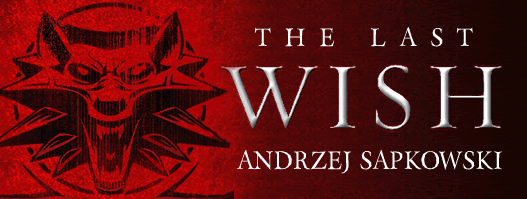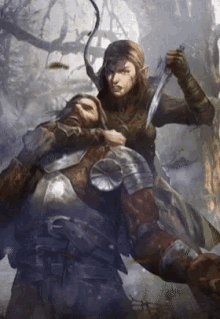In 1986 a Polish man named Andrzej Sapkowski began a series of stories that would have a massive impact on literature, video gaming, and television.
He published a short story in a contest for Fantastyka Magazine, and the reaction to his work was so positive, that he continued to write stories set in the very same world.
In just a few short years, Sapkowski had published 14 short stories, and was further inspired to begin writing a series of novels, all about a Witcher, Named Geralt of Rivia.
The Last Wish, is so named for one of its most important tales, and arguably one of the most important tales in the entire Witcher series.
Told with a framing story, The Last Wish has Geralt recounting some of his most daring tales, as he recovers from wounds he receives during the opening Contract to break the curse of a Strigga.
Geralt is a Witcher, a monster-hunter for hire. He is one of the few remaining individuals who were created specifically to fight the most fearsome beasts that plague "The Continent". But, rather than be praised for their services for defending everyone, instead, Witchers are hated as much, if not more so than the very creatures they are tasked to slay.
For many, hiring a Witcher is a means to an end, and this sad reality is borne out time and again. Witchers are humans that have been mutated by a mixture of magical and alchemical means. The initial plans made by the mages were to create magic-wielding super soldiers to clear out all of the monsters. Instead, their less than adept control of magic led to their project, and the Witchers themselves being abandoned.
However, the project was continued by a few renegade mages, but this further ostracized them and made them outcasts among outcasts. Eventually, after retaliation from humanity, many Witchers, as well as the means and process to create them, were lost. The world is a dangerous place, and magic and curses abound, as well as all manner of mythical creatures.
Sapkowski takes an interesting approach and goes beyond the traditional western fantasy monsters one would oft expect to see in a fantasy novel, and even subverting your expectations on how they fit into the world.
The world of The Witcher is cruel, it is dark, it is bloody. Sapkowski writes a fantasy world that is grittier, and for a lack of a better description, more realistic. Conflicts are quite prevalent in these stories, between socioeconomic class, as well as based on abilities. Children are gladly given up for coins, and Rulers act out of self-interest. Above all else, the biggest social issues raised come in the form of the Elves.
Whereas a Tolkien-esque setting would revere Elves as being nearly divine individuals, the wide populace of the Witcher World is incredibly racist toward them. This is such a pervasive notion, that it transcends all of the social strata. A noble and a peasant are both equally likely to cast out, or even outright murder an elf, given the chance... which they are (but that is beyond the scope of this review).
In a world such as this, it might come as a surprise to hear that many of the stories in this collection are based on classic Grimm and other Fairy tales and Folktales. From classics like Snow White to Beauty and the Beast, and even a version of The Little Mermaid; these stories are far bloodier, and much more complex than other versions you may know. cough “The Mouse” cough.
We also meet some completely unique characters as well. Geralt, our "Witcher", Dandelion (Jaskier in the Netflix show), and the ever-powerful and strong-willed Yennefer of Vengerburg. These three characters meet up at various points throughout these tales, and it’s their interactions that often drive forward the plot.
As an introduction to the series, this book is fantastic. Dripping with detail in the descriptions of creatures, locations, and battles, I found myself fully immersed at times feeling as if I could almost see the events. I will say that Id already watched about 3 episodes of the Netflix series by the time I started reading "The Last Wish", so it was interesting to see a few of the stories in a different light.
The dialogue between characters is absolutely excellent, and the vernacular employed in the world carries over into the video games as well, leading to a more cohesive multimedia experience. Duvvelsheys, afeared, and the list goes on.
There is a deep lore to this world, and you gain glimpses of it as time goes on. Hints towards future events are sprinkled throughout, and further expanded upon in the second collection "Sword of Destiny", which serves as a Pseudo-Sequel to "The Last Wish", and completes the set of stories that comprise the first season of the Netflix show.
Sapkowski poses some great questions that persist and return time and again, such as whether or not choosing the "lesser evil" is any better than choosing the greater evil. Much like the WOPR in "WarGames", the only way to win the game is to not play at all.
"Lesser, greater, middling... makes no difference. ... If I'm to choose between one evil and another, I'd rather not choose at all." - Geralt of Rivia.
My overall rating would be a 9/10. If you're looking for a fantasy book that blends incredible lore, with action and adventure, you're in luck. Though, there are a couple of stories that truly slow down the pace to provide interesting conversation and philosophical ideas. If you find yourself lost when the dialogues go philosophical, your mileage may vary.
If you're already a fan of the Show or the Games, then this is absolutely something you should pick up. If this is the first you're hearing of the series... Then there’s no better place to start, and with all the new Movies, Shows, and a next-gen re-release of the Witcher 3 [Coming Soon], there’s no better time to start than now!











